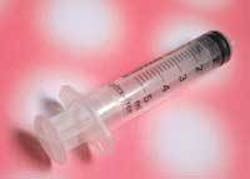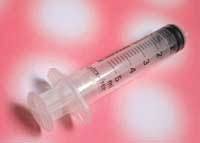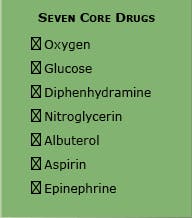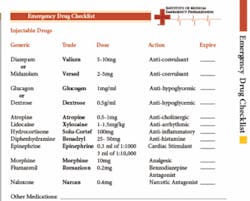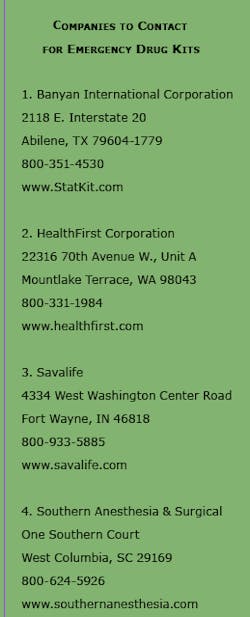The Emergency Drug Kit
by Dr. John B. Roberson and Dr. Christopher M. Rothman
Medical emergencies can occur at the home, ballpark, gym, in restaurants, and even on airplanes, but they happen every day in dental offices. Emergency drug kits contain the medications required for many such emergencies, including the (often multiple doses of) epinephrine needed for anaphylaxis, the nitroglycerin called for in cases of angina, and the albuterol used to treat asthmatics. The ADA Council of Scientific Affairs acknowledges the importance of emergency drug kits by stating that all dental offices should maintain at least the basic recommended emergency equipment and drugs. In fact, the package insert of local anesthetics states that dental practitioners should have the proper equipment and resuscitative drugs before administering any local anesthetic. Do you?
Do not fall under the illusion that all emergencies are resolved via a simple call to 911, and that emergency drug kits are unnecessary because emergency medical services can easily take care of any problems. With EMS response times averaging more than nine minutes in the city and 15 minutes in rural areas, calling 911 constitutes only one step of an effective medical emergency preparedness plan; treatment of a medical emergency should begin before EMS arrives.
The ADA Council of Scientific Affairs names seven core drugs that belong in every emergency drug kit: oxygen, glucose, diphenhydramine, nitroglycerin, albuterol, aspirin and epinephrine. Every dental office in the United States should have these seven drugs, up-to-date, to complete its store of essential medications.
Unquestionably, everybody in the office - the dentist, the dental hygienist, the dental assistant and even the nurses that work in the dental office - should be familiar with each drug within the drug kit, know each one’s effects, and be comfortable with drawing up and labeling the drugs for administration. Health care-related programs should have taught about the emergency drug kit. Thorough discussion of the emergency drug kit should take place during the monthly mock emergency drills performed by the office. Additionally, prepare documentation to use during a medical emergency that shows which drug was administered along with time, dosage and route; your records will be vitally important after the fact.
The merits of a “homemade” kit versus a “commercial kit” warrant some consideration. Emergency drug kits do not come in one size fits all, and the medications in your emergency drug kit will depend on the type of practice you have (pediatric, adult or both), and whether your office performs sedation. Placing various medications in Ziploc or paper bags is an antiquated practice and heightens the risk of drugs expiring. A commercial, proprietary emergency drug kit complemented by the automated renewal program ensures preparedness. Beware the predicament of needing to use an expired drug in an emergency. Never give an expired drug! Purchase the commercial kit, and the company you purchase from will keep you up-to-date on medications. If you utilize a “homemade” emergency drug kit, keep a monthly log of all the medications in your kit and ask someone in the office to reexamine expiration dates each month.
Store the emergency drug kit in a centrally located area of the office, inform everyone in the office of its location and remind them during monthly mock drills. Every office should also possess the ancillary supplies necessary to administer the emergency drugs (syringes, needles, alcohol wipes, etc.), and keep them with the emergency drug kit.
Commercial, proprietary kits are somewhat limited, but thanks to the companies that produce them (see below), these kits can achieve a sensitivity to the respective needs of individual dentists.
For the dentist who only needs the core seven medications, such a kit is available, as is a kit for the dentist who performs oral sedation, pediatric procedures, and intravenous anesthesia. The companies listed below also offer all-purpose emergency drug kits that meet the needs of every dentist regardless of the treatment and anesthesia delivered in his or her office. Some of these companies provide true “one and done” solutions for dental practices with an eye towards medical emergency preparedness, providing not only the emergency drug kit, but also products like the Emergency Response System by the Institute of Medical Emergency Preparedness, vital signs monitors, portable oxygen, automated external defibrillators, medications, and cricothyrotomy sets, to name a few. In addition, an automatic renewal program that will prevent dentists from having expired drugs is provided. For those interested in practicing safe dentistry by always knowing the status of their emergency drugs, the Institute of Medical Emergency Preparedness developed an emergency drug checklist within its comprehensive medical emergency preparedness system called the Emergency Response System (see sample on right).
Additionally, every dental office needs an automated external defibrillator, or AED. No drug in the emergency drug kit can treat a sudden cardiac arrest; an AED must be applied with the shock given within four minutes - too little time to rely on EMS to arrive. The American Heart Association recognized the importance of AEDs by making them a part of the BLS training program and other similar programs (www.heart.org). Every dentist now learns about AEDs when they take part in BLS training. To date, only Florida has mandated AEDs, but other states will soon follow.
In conclusion, follow these simple steps toward proper preparedness:
- Bring your office up to the proper standard of care by obtaining an emergency drug kit.
- Know the drugs and their actions within the emergency drug kit.
- Know the location of your emergency drug kit.
- Perform monthly mock drills.
- Don’t quibble over purchasing an AED, get one.
- Initiate a medical emergency preparedness system that trains the entire office on a continual, ongoing basis.
Drs. John B. Roberson, DMD, and Christopher M. Rothman, DDS, are oral and maxillofacial surgeons who are in private practice. Both are Board Certified by the American Board of Oral & Maxillofacial Surgery and the National Dental Board of Anesthesiology.
Editor’s note: The authors of this article are the developers of the Emergency Response System and are the co-founders of the Institute of Medical Emergency Preparedness. The ERS is a comprehensive medical emergency preparedness package developed for dentists and their staffs. The ERS may be viewed at www.emergencyactionguide.com. Contact Dr. Roberson at [email protected].
